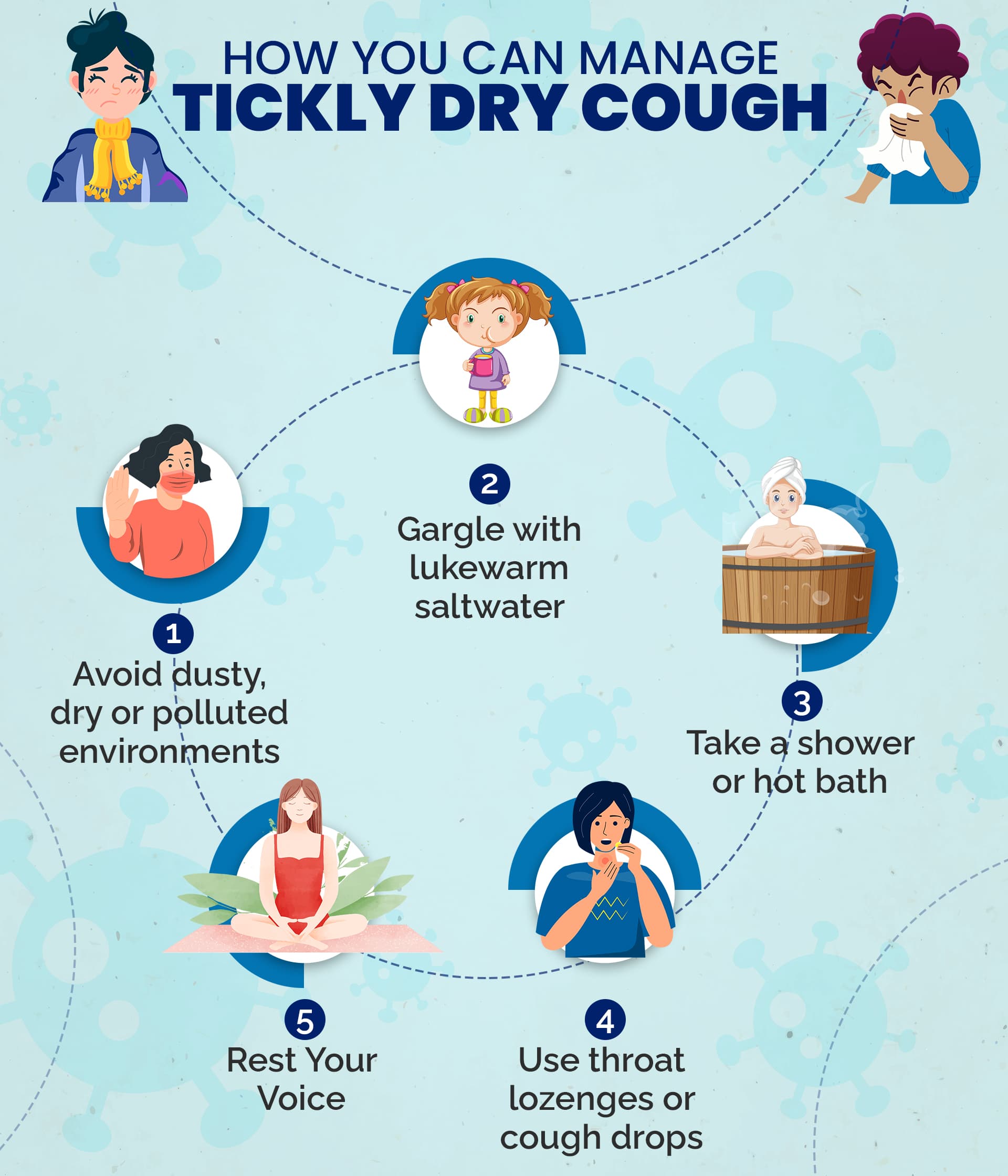
Dry Tickly Cough that Won't Go Away: Causes, Symptoms and Remedies
If you are having dry cough that does not go away, see a private GP to get treated quickly. This can prevent unnecessary complications in future.
Are you suffering from dry, persistent and tickly cough? If yes, then these tickly coughs can really be a matter of concern. You will need to seek advice of medical specialists about the causes, symptoms and possible remedies for this condition. It is necessary to know that a dry cough may be a symptom of serious underlying issues which might get worse over time.
What you need to know about a dry cough
A tickly cough presents like a dry cough, devoid of phlegm or mucus. Unlike having a chest cough, there is no accumulation of mucus or lung congestion involved in it. This kind of cough arises from inflammation in the upper respiratory tract, leading to some sensation of tickling at your throat.
Know about different forms of dry cough
Persistent Cough: When you have cough for an extended period, it is known as chronic cough. It seems to happen during the day and can lead to fits of coughing. There are extreme cases when it may be stubborn, painful and cause strained muscles or incontinence among the elderly individuals.
Tickly Cough: The tickling sensation in the throat leading to an unrelenting cough.
Barking Cough: This cough may occur during the day or night and may include wheezing.
Plum Pit Cough: This is when you feel a persistent lump in your throat that won't budge, that is usually accompanied by slightly acidic taste when you cough. This sensation is generally linked to gastroesophageal reflux disease, where stomach acid rises into the esophagus.
Wheezy Cough: This kind of cough gets worse during the night or when you wake up in the morning. Typically, it is accompanied by a wheezing sound leading to the constriction of airways, a condition known as bronchospasm. It is usually linked to asthma.
Dry cough and asthma
A good percentage of individuals suffering from asthma are left undiagnosed. If you have a severe cough of any kind, it is advisable to book a routine health check up with the doctor to find out if asthma is a contributing factor to it. Asthmatic coughs usually manifest with a wheezing sound. Inflammation might be the reason for constriction and narrowing of airways, resulting in decreased airflow.
Common signs of asthma include a cough which gets worse during exertion or physical activity, a sensation of chest tightness, shortness of breath or an overall fatigue feeling.
Tickly Cough Symptoms
The main symptom associated with a tickly cough is the sensation of itch in the throat. It usually triggers sneezing or natural cough reflex. When the cough persists, it may cause additional discomfort, including chest pain, runny nose and a sore throat.
Causes of tickly cough
Tickly coughs are generally attributed to recent cases of cold or flu. It is a condition usually referred to as a post-viral cough. During this period, individuals might suffer from flu-like and cold symptoms. Tickly coughs can be caused by to various factors such as allergies, temperature fluctuations or exposure to air pollution.
Causes of dry cough:
Acid reflux or Gastroesophageal Reflux Disease
Hay fever or allergy which gets triggered by pollution, pollen, dust, pet dander or second-hand smoke
Asthma
Conditions like bronchitis, sinusitis, and tonsillitis
Environmental factors, including dry climates and temperature changes
Inflammation of larynx causing voice loss
Medications
Smoking
Viruses
How will a tickly cough feel and sound?
A tickly cough occurs due to an inflammation of the airways. This leads to a sensation akin to something causing irritation at the back of your throat. This sensation leads to coughing due to the absence of mucus in your lungs. Despite the discomfort, there is no production of phlegm or mucus during a tickly cough.
How long will a tickly cough last?
There are cases when tickly coughs won’t necessitate medical attention immediately and they seem to resolve independently within a span of three to four weeks. It is important to exercise caution and seek proper guidance from a general practitioner when the cough lasts for a long time or gets worse. Prolonged tickly coughs might be possible indicators of underlying conditions such as heartburn, heart failure or asthma.
When it gets serious:
There are situations where you suffer from persistent dry cough which does not go away. It is important to book an appointment with the doctor. Seeking medical attention is always advisable when you suffer from a minor ailment or recover from an infection, as it ensures your condition does not get worse overtime.
In the case of a dry cough, this becomes very important. Though it is extremely rare, a chronic dry cough might be a symptom of severe and potentially life-threatening conditions such as:
Heart Failure:
A dry cough might sometimes be the reason for heart failure. It arises from the accumulation of fluid in your lungs.
This might take place when the heart is not pumping blood as efficiently as it should.
Coughing related with the buildup of plaque usually gets worse in the morning and can be the reason for breathlessness upon awakening.
Pulmonary Embolism:
Pulmonary embolism is a blood clot into the artery within your lungs.
These clots usually form in other body parts and then travel through the bloodstream to the lungs.
Symptoms might include coughing, possibly accompanied by blood and extreme chest pain.
Urgent treatment is necessary to address this condition, as it can be deadly when you do not treat it on time.
Lung Cancer:
It may not manifest any noticeable symptoms during its early stages.
Having a persistent cough can be one of the earliest signs of the progression of the disease.
This cough is distinct, new and unrelenting from previous coughs you may have already experienced.
Additional symptoms include a hoarse throat, shortness of breath, lung infections and wheezing.
Medical evaluation and proper diagnosis are necessary for appropriate treatment and management. Feel free to seek medical guidance when there are any concerns about your cough or its underlying causes.
How you can manage tickly dry cough
Though there is no treatment for tickly coughs, you will be able to eliminate the symptoms with correct management. Here are some top tips to deal with tickly cough:
Avoid dusty, dry or polluted environments: Exposure to these environments might trigger coughing fits.
Gargle with lukewarm saltwater: Gargling with lukewarm saltwater four times a day can lessen irritation to the throat and soothe the tickling sensation.
Take a shower or hot bath: When you inhale steam during a shower or bath, it provides moisture to the throat which can ease dryness. This provides relief from the cough.
Use throat lozenges or cough drops: These might stimulate production of saliva and keep throat moist to reduce the irritation.
Rest Your Voice: If you have a sore throat, it is necessary to give your voice a proper rest. Do not talk excessively or cause strain to the vocal cords.

How you can manage tickly dry cough
If the cough persists or worsens, it is necessary to consult with a healthcare professional for proper diagnosis and treatment. They can provide more specific guidance and may suggest further interventions if required.
Remedies for dry cough:
If you are suffering from a persistent dry and tickly cough that does not improve, you might consider using over-the-counter cough medicines. Different cough medicines have glycerol in them which is effective in dealing with tickly coughs and can help to lessen sore throat.
In summary from MD.co.uk
It is essential to prioritise your health and avoid ignoring any signs of illness. If you are not feeling well and are affected with dry cough that won’t go away feel free to book an appointment through MD.co.uk to connect the nearest private GPs. Seeking quick medical attention ensures you obtain proper diagnosis and appropriate treatment.

We Are Here!
Mon-Fri from 9am to 5pm




